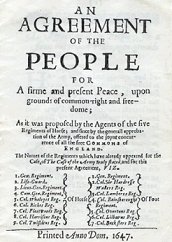Agreement of the People
With agreement of the people ( on agreement of the people for a firm and present peace upon grounds of common right , Engl. "Agreement of the People"), various versions were titled a manifesto with constitutional proposals during and immediately after the English Civil War were circulating. They are mostly associated with the Levellers , but versions have also been published by the agitators and the council of the New Model Army , i.e. Oliver Cromwell's independentist army. It contained political proposals or demands that particularly affected these groups or those of particularly great general interest. As a result of strong democratic tendencies, central themes were : religious freedom , equality before the law , general political participation, the end of prison sentences for debtors. The agreement was an important step on the way to shaping English democracy and human rights , especially the modern idea of tolerance and its realization.
After the end of the civil war, the agreement was discussed in the Putney debates from 1647 and increasingly watered down with exceptions, for example religious freedom should not apply to Catholics and the right to vote only for adult male landowners. Eventually the Levellers suffered defeat when the New Model Army opted to adopt another document as the basis of their demands: the Heads of Proposals , which had been put forward by the Army grandees .
literature
- Barbara Taft: The Council of Officers' Agreement of the People, 1648/9 . The Historical Journal 1985, pp. 169-185 (English)
Web links
- An Agreement of the People BCW Project, accessed December 15, 2017
- D. Alan Orr: Constitutionalism: Ancient, Modern and Early Modern in the Agreements of the People , in: Philip Baker, Elliot Vernon (Eds.): The Agreements of the People, the Levellers and the Constitutional Crisis of the English Revolution . Palgrave Macmillan, 2012, pp. 76–96 (English)
- The Agreements of the People, 1647-1649 The History of Parliament, December 13, 2012. Review by Philip Baker, Elliot Vernon (ed.): The Agreements of the People, the Levellers and the Constitutional Crisis of the English Revolution (English)
Individual evidence
- ^ W. Breach of values: Human rights. Historically , in Religion in Past and Present , 3rd ed., Volume IV, Col. 869
